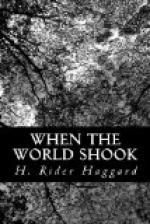They had no traditions as to how they reached this land, their belief being that they had always been there but that their forefathers were much greater than they. They were poetical, and sang songs in a language which themselves they could not understand; they said that it was the tongue their forefathers had spoken. Also they had several strange customs of which they did not know the origin. My own opinion, which Bickley shared, was that they were in fact a shrunken and deteriorated remnant of some high race now coming to its end through age and inter-breeding. About them indeed, notwithstanding their primitive savagery which in its qualities much resembled that of other Polynesians, there was a very curious air of antiquity. One felt that they had known the older world and its mysteries, though now both were forgotten. Also their language, which in time we came to speak perfectly, was copious, musical, and expressive in its idioms.
One circumstance I must mention. In walking about the country I observed all over it enormous holes, some of them measuring as much as a hundred yards across, with a depth of fifty feet or more, and this not on alluvial lands although there traces of them existed also, but in solid rock. What this rock was I do not know as none of us were geologists, but it seemed to me to partake of the nature of granite. Certainly it was not coral like that on and about the coast, but of a primeval formation.
When I asked Marama what caused these holes, he only shrugged his shoulders and said he did not know, but their fathers had declared that they were made by stones falling from heaven. This, of course, suggested meteorites to my mind. I submitted the idea to Bickley, who, in one of his rare intervals of leisure, came with me to make an examination.
“If they were meteorites,” he said, “of which a shower struck the earth in some past geological age, all life must have been destroyed by them and their remains ought to exist at the bottom of the holes. To me they look more like the effect of high explosives, but that, of course, is impossible, though I don’t know what else could have caused such craters.”
Then he went back to his work, for nothing that had to do with antiquity interested Bickley very much. The present and its problems were enough for him, he would say, who neither had lived in the past nor expected to have any share in the future.
As I remained curious I made an opportunity to scramble to the bottom of one of these craters, taking with me some of the natives with their wooden tools. Here I found a good deal of soil either washed down from the surface or resulting from the decomposition of the rock, though oddly enough in it nothing grew. I directed them to dig. After a while to my astonishment there appeared a corner of a great worked stone quite unlike that of the crater, indeed it seemed to me to be a marble. Further examination showed that




